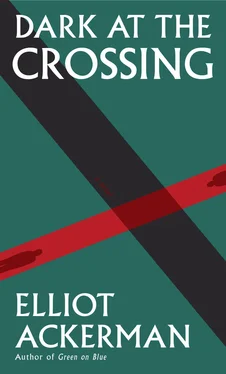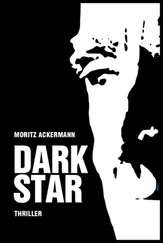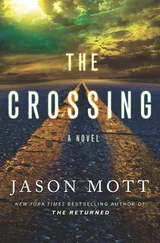Haris finished his shower. Cradling his filthy clothes, he returned to the living room. Amir stood in front of the console, arms folded, gazing down his nose. He watched the BBC like a statue watches visitors in a museum. Clips from a YouTube video played. A man around thirty, no older than Haris, stood on a road that ran through a field of wind-brushed high grass. He wore a camouflage rain jacket similar in pattern to Haris’s. Beneath the jacket, a bright red turtleneck crawled up to the man’s chin. A ticker ran across the bottom of the television screen: ABU SAKKAR, COMMANDER OF THE FREE ARMY’S INDEPENDENT OMAR AL-FAROUQ BRIGADE.
“The man had videos on his mobile,” explained Abu Sakkar. He looked directly into the camera but spoke past it: “It showed him raping a mother and her two daughters. He stripped them naked while they begged him to stop in the name of God. Finally he slaughtered them with a knife — what would you have done?”
The grainy video cut to a montage of propaganda. Abu Sakkar now stood in the field of grass. He knelt on a red-and-white prayer rug, praying Namaz, invoking the name of God. He walked through a town of narrow dirt lanes and rickety hovels roofed with corrugated aluminum. The residents turned out to greet him. A waving grandmother blew him a kiss. He laughed.
Something about the laugh set Amir off. “You know about him?” he asked, turning away from the television. Haris had followed the war closely. He knew about Abu Sakkar, but he didn’t say anything. “This idiot commands a brigade,” said Amir, switching from Arabic into his formal manner of English. “You know what he did before?”
Haris shook his head.
“A day laborer,” answered Amir, again looking down his nose toward the BBC. “The revolution is now commanded by day laborers.”
A disclaimer flashed across the screen: THE FOLLOWING CONTENT MAY BE DISTURBING FOR SOME AUDIENCES. Another YouTube video played, this one heavily pixelated, a recording off a cheap cellphone. Abu Sakkar wore the same camouflage jacket but with a white turtleneck beneath. His Kalashnikov hung lazily by his side, as if the rifle had become too heavy for him. At his feet, a man’s tangled corpse splayed against the wet earth. Abu Sakkar stepped on the man’s chest. He looked at the camera in the same far-off way as before. “We will eat your hearts and your livers, you soldiers of Bashar the dog.” He unsheathed a knife from his belt. He worked at the body beneath his foot. Off-camera a raucous voice cheered: “It looks like you’re carving him a Valentine’s heart!” When Abu Sakkar finished, he gazed at the camera, raising his hand to his mouth. His lips closed around a wet mass, shining with greasy blood.
The BBC report returned to the other YouTube video. Abu Sakkar again stood on the road, surrounded by high grass. The wet asphalt ran into the distance. He spoke in that direction: “Put yourself in my position,” he said. “They slaughtered my brothers. They murdered my uncle and aunt. All this happened to me. I didn’t want to do this. We have to terrify the enemy, humiliate them, just as they do to us. Now they won’t dare be wherever Abu Sakkar is.” The wind blew, parting the high grass. Abu Sakkar faced back toward the camera, saying nothing.
Then he raised his hand and made a V sign with his index and middle finger — V for victory, or for peace. The revolution had brought this well-worn gesture back into fashion, though it meant two very different things, or perhaps the same thing. He walked into the road’s distance, his Kalashnikov again hanging heavily at his side.
The BBC’s report finished. Amir muted the television, tossing the remote on the sofa. “The commander of the Farouq Brigade — a heart-eating day laborer.”
Haris thought about his last job in Dearborn, fixing small things at the university, the tables and chairs at which students like his sister studied. He’d been no better than a day laborer and wondered in what other ways he might be like Abu Sakkar.
Then Amir’s cellphone rang. He stepped in front of the dresser and picked it up. “Bonne soirée, ma chère.”
A woman’s muffled voice came from the receiver.
“I’m also bringing a friend,” answered Amir, returning to Arabic. He listened for a moment and added: “Yes, I’d heard she finally left. It will be lovely to see her. Meet you both there.” He hung up, setting his phone on the dresser. Amir preened in the wall mirror, picking apart his curls. He evened them out with perfectly manicured hands except for a couple of fingers that were smooth, missing their nails. He palmed down one stubborn lick and shrugged his shoulders, happy enough with his work.
Haris caught his own reflection, standing in his new clothes with the filthy old ones tucked beneath his arm. Wide eyes, mouth slightly agape, rutted forehead — Haris appeared tense, like he was about to ask a question, one he couldn’t quite remember.
“You seem upset,” said Amir.
“I’m not,” said Haris. He held up his dirty clothes, as if asking where he might wash them.
“Let’s get rid of those,” replied Amir, snatching a plastic shopping bag from beneath the sink. Haris placed the bundle inside, and Amir knotted the handles to contain the stench. “Keep the clothes I gave you. You’ll find work quickly. Then you can buy another set at the mall.”
“The mall?” asked Haris, his voice wavering.
“You are upset. I should’ve turned that video of Abu Sakkar off. That’s what any reasonable person would do, just turn it off.”
“It’s not that. I didn’t know there was a mall here.”
“Oh,” said Amir. “The Turks opened it just after the war started. It’s right on the park, even has an ice rink. We’ll meet my wife and her friend at Big Chefs for dinner, my treat.”
“I’m imposing on you enough,” said Haris. “I can stay here.”
“You’re the one doing me a favor,” answered Amir. “My wife always complains that this place”—and he waved his hand at the cramped corners of the apartment—“doesn’t feel like home. The few times people have stayed with us have been the only times she’s snapped out of her homesickness. If we have a houseguest, we have a home.”
They left the apartment and walked along Yusuf Bulvari toward Amir’s Peugeot. At the edge of Antep City Park, elms crowded the roadside, beautiful yet awkwardly planted, like a garden with too many fountains. The early moon silvered their leaves, which had yet to turn in the late autumn, and the wind creaked through their branches. At the trunks of the larger trees refugees bedded down for the night on cardboard slats, their shoulders blanketed with newspapers, their voices traveling thick as a conspiracy through the patches of shadow. As Haris and Amir passed, the sleeping refugees awoke. The sound of their bodies rustling alert beneath the newspapers blended with the sound of leaves rustling in the branches.
Reaching the Peugeot, Amir held up his hand, asking Haris to wait a moment. With the bag of dirty clothes cradled in his arm, Amir stepped into the dark elm grove. Nearly out of sight, Haris saw him crouch next to an old man who slept beneath a tattered gray blanket. He placed the bag next to him. The old man stirred. Jogging back to Haris, Amir pulled out his keys and unlocked the car.
As they climbed inside, the old man came out of the park, lumbering toward them. His blanket hung over his shoulders, brushing at his ankles. He grasped the bag to his chest. Cursing after Haris and Amir, his voice traveled in the snatches of wind which gusted between the elms.
“Can’t you do better than these rags!”
Amir paused for a moment, as if uncertain what to do or say. Then he smiled, flashing the old man a V sign as he slammed his door shut.
Читать дальше












